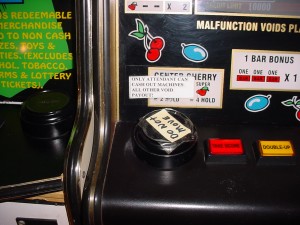Gaming Machines In Texas Gas Stations
If you want to make your local corner store owner really nervous, try asking them this question – “How do those gaming machines work?” When I asked the owner of a store that I frequent, I got a very nervous “Why do you ask?” in response. It seems almost every independently run convenience store I go in has a small bank of video gaming (gambling) machines, also known as eight-liners, tucked away somewhere in the store. I got curious about all these machines and thought I’d write a post to share what I found out. This is an abnormal post for this site but falls under the “Dad is Learning” philosophy of living.
A BIG Loophole
Laws on video gaming machines vary from state to state. Texas is surrounded by states that allow gambling, leading to a high number of attempts to circumvent laws against gambling in Texas. Section §47 of the Texas Penal Code defines gambling but in §47.01(4) you will find the provision that has been litigated for over a decade that excludes “gambling devices” that are defined as “any electronic, electromechanical, or mechanical contrivance designed, made, and adapted solely for bona-fide amusement purposes if the contrivance rewards the player exclusively with non-cash merchandise prizes, toys, or novelties, or a representation of value redeemable for those items, that have a wholesale value available from a single play of the game or device of not more than 10 times the amount charged to play the game or device once or $5, whichever is less.” This is often referred to as the “fuzzy animal” defense, derived from the claw games you see in restaurants and elsewhere.
The loopholes in the law are numerous. The Dickinson County Police have posted an advisement from the Galveston County District Attorney’s office about this matter. Here are a few noted exceptions quoted from that site:
- Regarding the “charitable sweepstakes” issue: Typically this is done by some type of an association being made with the charity group by the owner of the 8-liners. The players put their money into the machine as a “donation” and you are allowed to play the game for free. At the end of the day the Charity may pay the owner of the machines $.90 out of every $1.00 collected. This is not an exception to the law.
- The use of “door prizes” to attract customers is presumed to be legal, provided the players are not given additional entries into the door prize drawing based on the number of credits they win on a game or device.
- The following could result in prosecution – Any award of non-cash merchandise prizes, toys, or novelties that have a wholesale value available from a single play of the game or device of more than 10 times the amount charged to play the game or device once, or $5.00, whichever is less. The accumulation or stacking of credits/tickets toward the purchase of more valuable prizes will be considered to be a violation of the law if the accumulated credits exceed the maximum value for a prize which can be awarded from the machine as noted above. The wholesale value of the prize, not the ticket, available from a single play, must be no more than 10 times the amount charged to play or $5.00, whichever is less.
The Difficulty of Enforcement
Gathering enough evidence to prosecute illegal gaming operations costs thousands of dollars and numerous man hours in already stretched thin police departments and district attorney offices. The machines are fairly portable and can be removed by simply unplugging them and wheeling them away on a dolly. Operations have been known to shut down and move overnight when there is suspicion of investigation. Due to the high volume of money involved, a few police officers have also been bribed to tip off the owners of illegal operations as occurred in Tarrant County in 2008.
The Meadowbrook Shopper, a neighborhood publication in Fort Worth, featured an interview with Tarrant County Sheriff Dee Anderson in the January 24, 2013 edition where he spoke about eight-liners in Fort Worth. Anderson said, “The machines have almost been eradicated in the county. At one time, we would have thousands of them in storage. Now, thanks to civil forfeiture through the Justice of the Peace Courts, we can seize them and have them destroyed within two weeks. Unfortunately, we’ve been so successful the machines are moving into smaller cities.”
Many may not have issue with the morality of the machines but call authorities when a loved one loses large amounts of money to unregulated gaming machines. Anderson said, “More-and-more we will get calls from concerned relatives when their parents, or older relatives on fixed incomes, get scammed out of all their money involving eight-liners. Believe me, it’s a big problem. There are usually drugs associated with these operations. It’s not uncommon for us to seize 20-40 thousand dollars after raiding just one small operation.”
Illegal gaming operations are also an easy target for criminals. There is typically a large amount of cash involved and operators won’t contact the police due to the illegal nature of their activities. This Star-Telegram article from 2013 details a Fort Worth man who was ambushed, robbed, and murdered in September 2013 outside of an illegal gaming operation.
Why Was I Curious?
As I mentioned at the beginning of this post, I frequent two convenience stores that have a few of these machines. Let me be clear…I don’t play. These aren’t the illegal gambling dens that involve so much of the trouble documented in this post, but they are quite possibly operating in a grey area of the law. One store is close to my office and every time I have been in that location there is at least one person settled in and poking away at a machine. As several articles report, it is quite often people on a fixed-income, the unemployed, or the elderly who play on these machines.
My curiosity was also peaked by an auction on LonestartAuctioneers.com this week. I follow the site regularly as part of my side hustle but was surprised to see gaming machines being auctioned off by the Texas Facilities Commission. I wasn’t familiar with this agency, but part of their responsibility is the oversight of surplus property programs. The machines in the auction went for an average selling price of $300 to $400, plus 10% buyers premium. The 31 machines in the auction fetched a total of $8,540 plus buyers premium.
I follow the opinion of most financial advisers, who believe gambling in it’s various forms is a tax on the poor and people who can’t do math. Dave Ramsey offers up great insight on the matter of gambling in “Gambling Offers False Hope.” There is a reason the big casino across the border builds a new hotel building every year. And there is a reason individuals are willing to risk a $4,000 fine and maximum sentence of a year in jail for running illegal gaming machines. Gambling is a sure-fire money maker for the owner.



Can one pick up a copy of the Meadowbrook Shopper in these convience stores as well ? And if so, which ones ? I really enjoyed that when we lived over there and kind of miss it.
I believe we get a small stack here at the building since we publish with them. I’ll double-check that and let you know.
typo on convenience. Oops
Jon, I enjoy your blog very much. On the current topic, a few years ago I went to a Law Enforcement Training Seminar at the Foxwoods Casino in Connecticut. During a down time I walked onto the gaming floor and looked around. I was curious because I had never been to a casino before. I was struck by the people playing the various games, particularly the slot machines. They seemed to be mostly elderly or disabled. None of the players were smiling or indicated in any they that they were having any “fun.” How sad, I thought.
You’re right about the house having the advantage. Just look at elaborate decorations and furnishings. Nice job on this article.
Thanks Gerry! I too have walked around a casino once just to observe. I saw the same thing you did. There is definitely a habit forming behavior to the slot machines.
The convenience store I frequent does not have these machines but I have recently noticed them in a couple of convenience stores in the area. When I first saw someone sitting at one I had to look again because I didn’t realize what it was (or why someone was willingly hanging out at the gas station). I don’t know if I’m just naive to that environment or what but I was pretty shocked to see that happening so casually and conveniently. I just assumed I was late on the uptake. Interesting post.
Thanks Beryl! I also thought it was odd that people would be hanging out in the back portion of a service station…but now we know why.
Pingback: E-Cigarettes and Vapor Shacks: Dad is Curious - Dad Is Learning
Even in the states where the lottery (but not gambling) is legal, you will see huge signs suggesting that participants “play responsibly.”
Is that possible? When those on a fixed income take money needed for food and shelter to buy those tickets? We know that getting something for nothing without rendering service or exchange of goods is essentially stealing and a form of robbery. How can one do that responsibly?
You’re right Beth…gambling would be something that would be pretty hard to do responsibly. It is definitely a tax on those who can’t do math.
I used to be the store manager at a valero. While I worked there the stores machines were taken. I just happened to walk into anot her gas station, and I asked the lady if the machines were illegal. Whicheck I know they are, and she said no as long as they make their donations? What does this mean? I thought gambling was illegal? They are paying out cash to these people! Any insight on how to report them?
The donations comment is an interesting one. Who is getting the donation? And what for? The fine in most areas of TX for having these machines is a max of $4K. It costs more than that for the police to gather evidence of illegal gambling. As long as the gaming area keeps things clean and doesn’t have a bunch of trouble like robberies, etc. they will fly below most police radar. The cities need to act to close the loopholes on gaming machines if the state will not. The state actually auctions off siezed machines through the Texas Facilities Commission which blows my mind. Video gambling is illegal in Texas but the machines are not. Payouts over $5 for a single win are illegal as well.
Who can I call about fraud on gas station taken people’s money on gambling machines in texas!
Gaming machines in Texas convenience stores are in a grey area of the law. Video gambling is illegal but the machines are not. If I remember the law correctly, a game is considered “amusement” if it pays out less than $5 in a single win or less than 10x the amount it cost to play the game. Fraud on the machines would be challenging since there is not really a regulatory agency for game play.